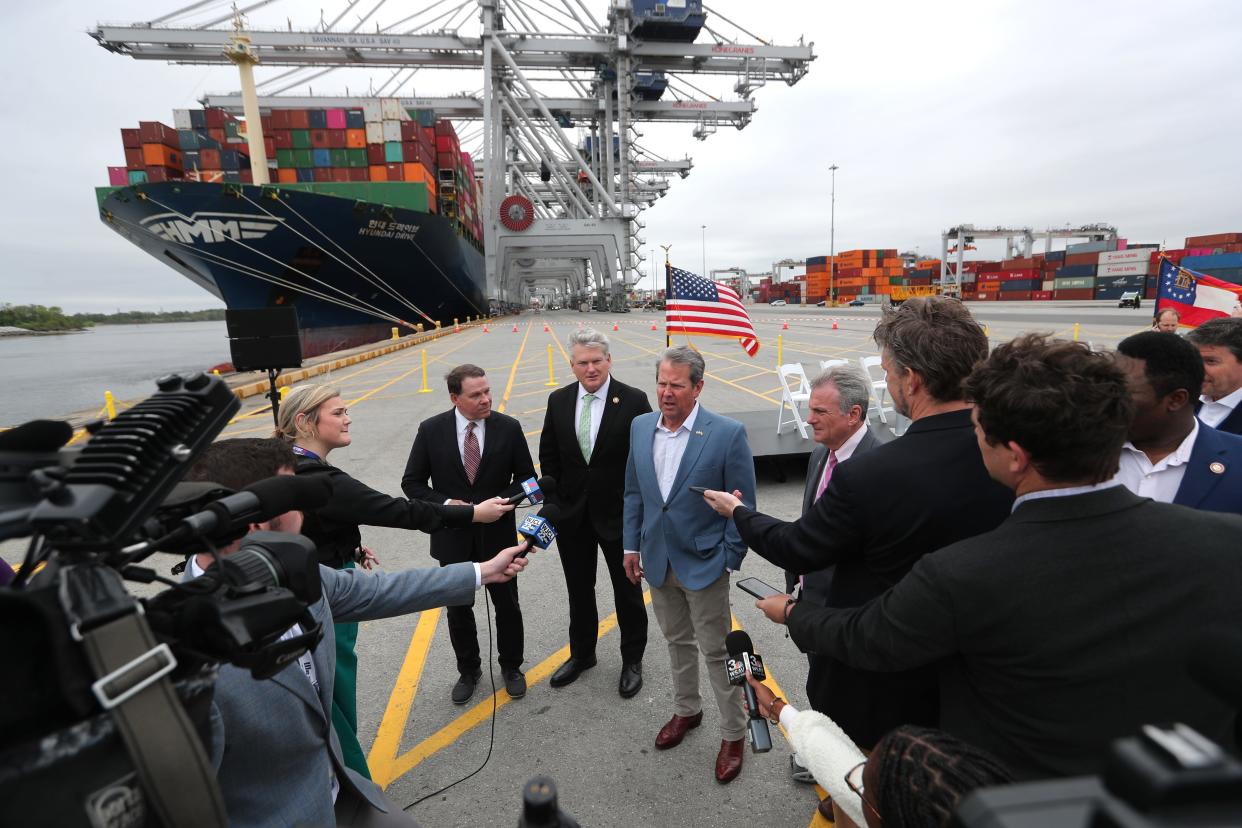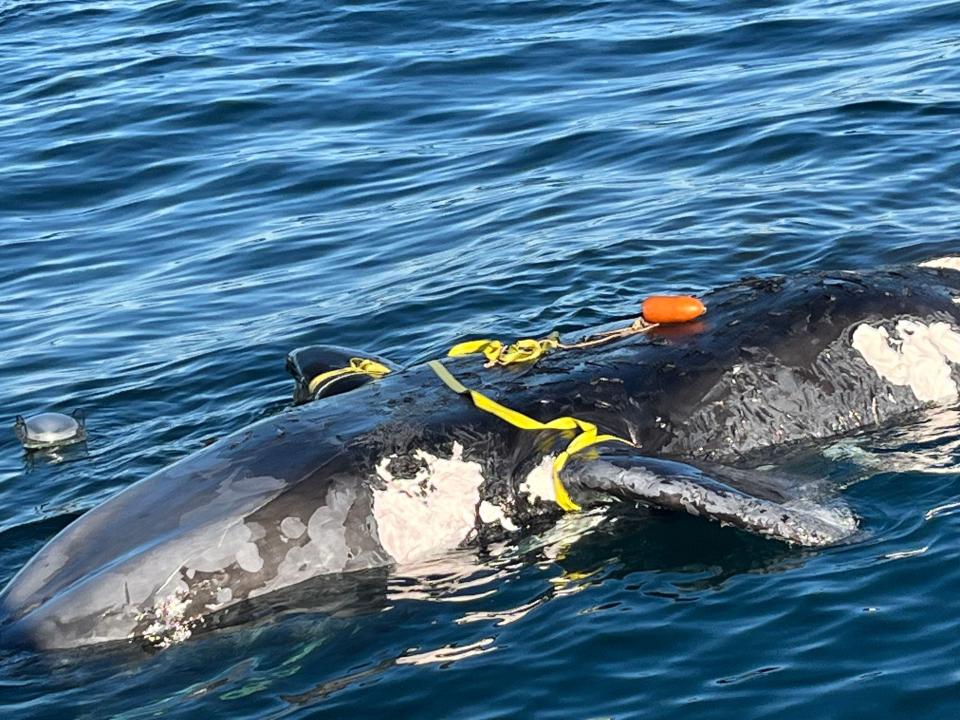GA Gov. Kemp, congressman blast right whale protections without addressing key exceptions

- Oops!Something went wrong.Please try again later.
- Oops!Something went wrong.Please try again later.
Key Republican leaders in Georgia this week continued calls to harpoon proposed federal regulations aimed at protecting endangered North Atlantic right whales off the state’s coast.
At an event in Savannah on Monday, Gov. Brian Kemp and U.S. Rep. Mike Collins blasted draft rule changes by the National Oceanic and Atmospheric Administration Fisheries division that would expand existing seasonal speed limits in waters frequented by right whales during their calving season.
Current federal regulations set a maximum of 10 knots (11.5 mph) from mid-November to mid-June for vessels at least 65 feet long in a protective zone stretching from Brunswick, Georgia, to Wilmington, North Carolina.
The new rule, sent earlier this month for review by the White House Office of Information and Regulatory Affairs, sets the size threshold at 35 feet.
Kemp and Collins on Monday echoed an oft-repeated criticism of the change: that it will have an outsized impact on “river pilot” boats serving the ports of Savannah and Brunswick and, by extension, Georgia’s entire cargo shipping industry.
In Savannah, the highly trained pilots steer cargo ships along the potentially precarious 25-mile navigation channel. But to do that, they need to get to and from the vessels when they’re still at sea.
“The National Oceanic and Atmospheric Administration's proposed rule stands to risk lives and create supply chain challenges exceeding even those we saw during the pandemic,” Kemp said during an event hailing a proposal to study further deepening of the Port of Savannah’s shipping channel.
Collins, from Jackson, doubled down on the governor’s claim.
“For our pilots that are out there, boarding these vessels, it’s going to put their lives in danger," Collins insisted. “It's going to destroy an industry that provides $84 billion to our economy; 340,000 jobs are at stake with this.”
It’s a position also staked regularly by U.S. Rep. Buddy Carter, whose district includes Georgia’s entire 100-mile Atlantic coast.
While Carter didn’t address the rule change Monday, he did make his case in a recent blog post.
“The speed restriction is unworkably slow and will increase the risk of capsizing,” he wrote. “We must acknowledge that, while protecting the right whale is important, those conservation efforts cannot pose a threat (to) human lives.”
In a countermeasure, Carter introduced a bill last summer that would prohibit NOAA from spending federal dollars to implement the rule change until its parent agency, the U.S. Department of Commerce, develops and deploys new technology to monitor Atlantic waters for right whales.

Towed ashore: Whale found dead off Tybee Island likely was hit by passing vessel, officials say
Exceptions to the rule
However, what Kemp, Collins and Carter didn’t mention is that NOAA’s amended regulations include provisions aimed at protecting vessels in the river pilot boats’ size range from the potential hazards of operating within the seasonal speed standard.
Vessels could legally exceed the limits when it is “necessary to maintain safe maneuvering speed and justified because the vessel is in an area where oceanographic, hydrographic, and/or meteorological conditions severely restrict the maneuverability of the vessel and the need to operate at such speed is confirmed by the pilot on board.”
The standards also would be waived if the National Weather Service issues a warning that includes potential gale-force winds (at least 39 mph).
After 18 months of consideration, NOAA sent the proposed change on March 6 to the White House Office of Information and Regulatory Affairs, a division of the Office of Management and Budget that reviews federal regulations originating in the Executive Branch.
That came three days after a shark-scavenged carcass of a right whale calf – the first newborn identified during the current birthing season – was discovered at the Cumberland Island National Seashore in Georgia.
The calf, the eighth documented offspring from a whale known as Juno, was observed Jan. 3 with serious wounds to its head, mouth and lip from a vessel strike.
Responders identified the dead whale as Juno’s calf based on its “unique injuries and markings” noted in earlier observations, NOAA said.
It was the second reported fatality during the current Atlantic calving season. A year-old female right whale, also the victim of a vessel strike, was found dead Feb. 13 floating about 20 miles from Tybee Island.
According to NOAA, at least 39 North Atlantic right whale deaths have been confirmed since 2017. That represents more than 10% of the current estimated right whale population, which researchers believe includes fewer than 70 reproducing females.
About one-third of the deaths were the result of vessel strikes, and 40% of those involved collisions with boats in the 35-to-65-foot range, NOAA says.
John Deem covers climate change and the environment in coastal Georgia. He can be reached at jdeem@gannett.com
This article originally appeared on Savannah Morning News: Brian Kemp, Mike Collins omit exceptions to right whale protections

